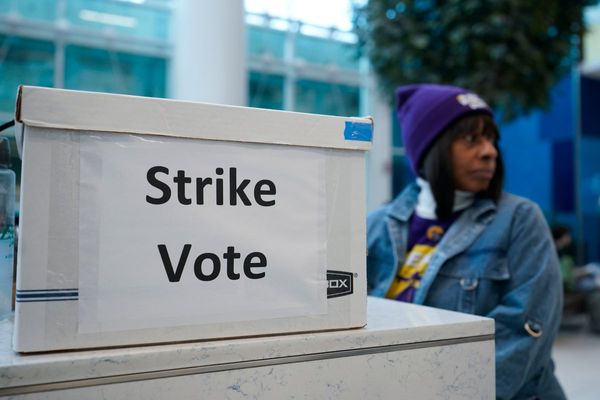Let’s give credit where it’s due. Most people don’t follow through with their New Year’s Resolutions, but at least AMC Entertainment (AMC) CEO Adam Aron is trying.
Following a Tweet earlier this month in which the head of the beleaguered movie theater chain announced plans to “refinance some of our debt to reduce our interest expense, push out some debt maturities by several years and loosen covenants,” he’s now making moves to try to get the job done.
Aron has reportedly been “in advanced talks with multiple parties” about refinancing, according to The Wall Street Journal. But the ongoing volatility of the stock market, amongst other factors, is complicating matters.

Irfan Khan / Los Angeles Times via Getty Images
Rough Years For AMC
To make it through the pandemic, AMC ended up having to take on a great deal of debt. It reportedly owed $5.5 billion as of last September and also owed $376 million worth of lease payments, which were deferred for a while during the pandemic.
But as we’ve previously mentioned, the past few years have been tough for theater chains such as AMC. Even before the pandemic put a pause on theater-going in 2020, leading to an absolutely brutal total box office gross drop of 81.4%, general audiences were increasingly only heading out to movie theaters for blockbuster films and franchise installments, often from the Marvel Cinematic Universe or the “Fast & Furious.”
AMC had a reported net loss of $13.5 million in 2019, even as total revenue was up 2.4% to $1.44 billion from the year before. Things improved for the company last year once people felt safe returning to the theaters, as access to vaccines helped unlock some pent-up demand, and the box office rose by 112.5% to $4,468,850,254.
A big chunk of that rebound is due to the jaw-dropping success of “Spider-Man: No Way Home,” which recently returned to the top of the box office, on its way to making $1.69 billion worldwide. (Will Peter Parker eventually conquer the blue aliens from “Avatar” to become the highest-grossing film of all time? Stay tuned.)
But you can’t turn around a struggling industry based on the success of one film, and even Marvel and Disney (DIS) can’t put out a general-audience pleasing blockbuster every week.
Even with a new “Scream” film out, last weekend’s box office total barely totaled more than $43 million, a far cry from five years ago. “That's down from a pre-pandemic $105 million in 2020, $73 million in 2019, $102 million in 2018, and $111 million in 2017, according to data from Box Office Mojo.”
Memes Saved AMC (For A Little While)
Last year AMC received an unexpected lifeline when it became the subject of an internet-driven rush that turned it into a short-lived meme stock.
After a Reddit-incubated army of internet investors, who dubbed themselves “apes,” began buying shares in AMC through trading applications such as Robinhood, shares of the company temporarily rose to a robust $62.55 a share. Prices would eventually return to earth, hitting $35 a share after the hype dropped down. But the boost allowed Aron to buy the company some time.
AMC used the cash infusion to repurchase $35 million worth of debt that carried a minimum interest rate of 15%, according to Yahoo! Finance. The deal cost $41.3 million, but it is expected to reduce the overall annual interest on its debt by about $5.3 million.
This year Aron is stepping up his efforts to refinance AMC’s debt, but it’s rough out there at the moment.
Amid Wall Street’s current market contraction, AMC’s stock has dropped by 41% this year, erasing the meme stock gains, and AMC’s $1.5 billion in secured 10% bonds “traded as low as 92 cents on the dollar, down from 99.5 cents at the start of the year,” according to The Wall Street Journal.
AMC isn’t looking to refinance all of its debt. Instead, it is targeting some of the bonds with especially high interest, as a way to cut expenses even as bond prices continue to drop.
But it seems like the meme stock rush has turned out to be a double-edged sword.
AMC was able to stay in business by “selling new shares, taking on new debt, and getting landlords to agree to delay collecting rent payments.” But meme investors have objected to Aron’s plans to allow more AMC shares to be sold, out of fear that it would dilute what they’ve already purchased.
Aron and AMC have a skittish-at-best stock market and an industry that is struggling to get people into theaters for all but event films. On the other hand, it has a loyal group of investors that are nonetheless limiting the company’s options.







